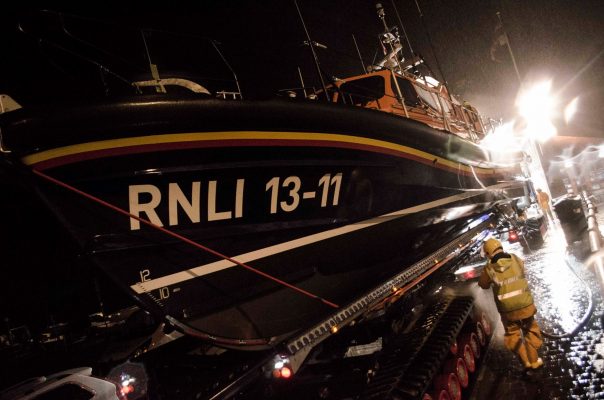A solo skipper was rescued by a Dutch merchant ship after his Rustler yacht dismasted off the Cornish coast. He had to use flares to call for help.
The UK Coastguard is calling on all sailors to make sure they have the proper communications equipment on board after a yachtsman had to be rescued off the Cornish coast.
The solo skipper of the 31-foot Rustler yacht was on passage from Cardiff to Plymouth when the vessel dismasted.
In the early hours of 22 November 2016, the man had to release red flares to call for help, around 30 miles north west of St Ives.
Luckily for him, the flares were spotted by the Dutch merchant vessel, Morgenstond II, which reported the sighting to the Falmouth Coastguard Operations Centre.
The Coastguard search and rescue helicopter from Newquay and the RNLI all-weather St Ives lifeboat, Nora Stachura, were sent to the area at 1.30am.
A spokesman for St Ives RNLI said the weather condition were “very poor for the launch into the dark night, with 55 knot (force 10) winds.”
Within 25 minutes of the launch, Falmouth Coastguard radioed the lifeboat crew that the Morgenstond II had transferred the single casualty onboard by ladder, and abandoned the broken yacht.
The lifeboat crew were then stood down and were able to return to base.
Speaking following the shout, the St Ives Lifeboat coxswain, Robert Cocking said: “Despite the weather conditions on the night, everybody involved in the incident did a superb job and I can’t thank them enough for their time and effort.”
The UK Coastguard is urging all sailors to be as prepared as possible when they go sailing.
Tago Mcleod from the UK Coastguard said: “We highly recommend anyone going out to sea should invest in the correct communications equipment including a fixed DSC VHF radio, a back-up VHF radio and ideally a distress beacon too. In this instance the crewman was lucky a passing vessel noticed his distress flare and was able to inform us of the situation.”
“Weather conditions can change in an instant, always check the weather and tidal conditions before you set out so that you can prepare accordingly,” he stressed.
“To help us in locating you, should you get into difficulty, consider joining the MCA’s voluntary CG66 safety identification scheme. Always tell someone where you are going and when you expect to return. Update them if your plans change,” urged Mcleod.
Passengers trapped after weather conditions prevent ferry from docking
Passengers on board the Rosslare-Fishguard Stena Line ferry service have spent a night stranded in the Irish Sea after bad…
UK Coastguard and RNLI assist catamaran near the Mersey Bar
The UK Coastguard asked for the assistance of the Hoylake RNLI after a high speed catamaran suffered engine problems
MAIB publishes investigation report into collision between cargo ship and barge in Channel
The Marine Accident Investigation Branch has published a safety investigation report into the collision between Saga Sky and Stema Barge II…






